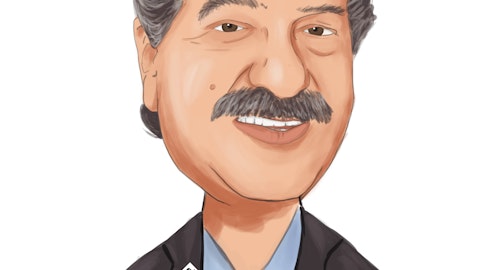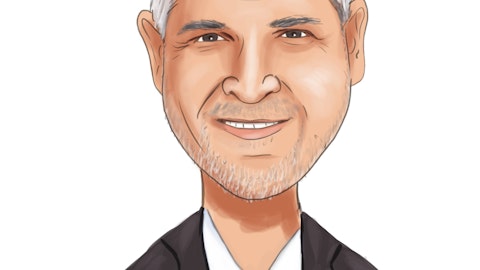Mike Metcalf : Yes, hi, John. This is Mike. It actually carves out from that bucket and segregates these new markets that we’re seeing all this accretive growth and so yes, it is a subset of that traditionally reported other buckets.
John Deysher: Okay, good. So and the new segment will be basically everything that you talked about a year ago in terms of electrical automation, service expense, and all of that kind of thing.
Brett Cope: It would be in there. This would be — the other segment, a specific sort of the end market segment. We’ve always done work in pulp and paper. We’ve done work in data centers, although sporadically it just become more consistent over the last 18 months and started rising on the revenue side. So we felt it was prudent to carve it out in the segment.
Operator: And our next question will come from Tom Spiro with Spiro Capital.
Tom Spiro : Good morning. Fine. Congratulations on a strong fourth quarter and on getting that LNG business good for you. Just one little housekeeping, your utility business, what segment will that show up in utility? Is that going to be in the new business, a new segment or in an old segment? Where will that be reported?
Brett Cope: That has been reported in its own sector, and it will continue to be reported in the utility sector. No changes there.
Tom Spiro: Okay, great. Thanks, R&D spending for the new year do you think it’s going to change much?
Brett Cope: So I think heading into the year flattish up, to up a little bit. But in line with what we’ve talked on our strategic plans and with adding to the team with Marshall and others, there’s some work we’ve done this year to allocate that capital into longer term. Look at the market 5-10 years out, we’ve made some moves this year on investment. And I think as Marshall comes on, and the team spins up, I think in future years, we would anticipate increasing that but not quite yet into next year.
Tom Spiro: What is the background of the new VP of R&D? Where did he come from?
Brett Cope: Most recently, S&C Electric, also had started his career with Eaton and Schneider in his background, so really well rounded on the primary and as well as the secondary side of switchgear, which fits us perfectly.
Tom Spiro: That’s great. You’re, I guess, coming to the end of that large LNG project you won a couple of years ago, I wonder number one, when you finish it up? And number two, how has it gone?
Brett Cope: Number two, it’s gone very well I think from all aspects, it hasn’t been without its challenges. We knew heading into the project, I really give credit to the project team. And the commercial team that secured the bid, they’ve done a great job, from the outset of the securing the job, identifying the risks, managing those risks with the project. Certainly staying very close with our client, with the engineering partner and the end client. And I think I’m, all I can say is I’m very pleased with how it’s executed. It still is somewhat ongoing, although it’ll be tailing off as we get through the bulk of ’23 year.
Tom Spiro: I see. And earlier in this call, you had a little discussion of the impacts on gross margin of the changing mix of business, and I didn’t really understand the point you were trying to make. Maybe you could take another go at it. As your mix changes, some of these new lines of business grow services and other technologies and stuff. How will that affect your margins?
Mike Metcalf : Yes, Tom, this is Mike. When you look at our mix, the question that John brought up back five, seven years ago, when gross profits were in the high teens, that mix contained a lot of oil and gas work. As Brett alluded to the oil and gas sectors now, we’re just beginning to recover. But what we’re seeing that supplementing a lot of this volume is utility type of work, commercial and other industrial work, which typically doesn’t carry the margins that the oil and gas work did back in back five, seven years ago. So that was my comment on the mix when you look versus prior years, right. Yes, the complexity of those jobs from what Powell is built for in our 75-year history. It’s not to say they’re easy, but they’re just not as in depth or complex with a lot of changes on loads, because you don’t have all of the process changes that happen on an industrial facility.
So it’s been a great build in our diversification last year. And we look to continue that both in the market side as well as the development side. And then the other part is the service bus, it did pick up this year, that also has a tendency to have a different phasing on the cycle. And it makes it complexities but it’s been a really nice add to the story under pressure.
Tom Spiro: Do the margins on services tend to run higher or lower than your traditional oil and gas business?
Mike Metcalf : Higher.




